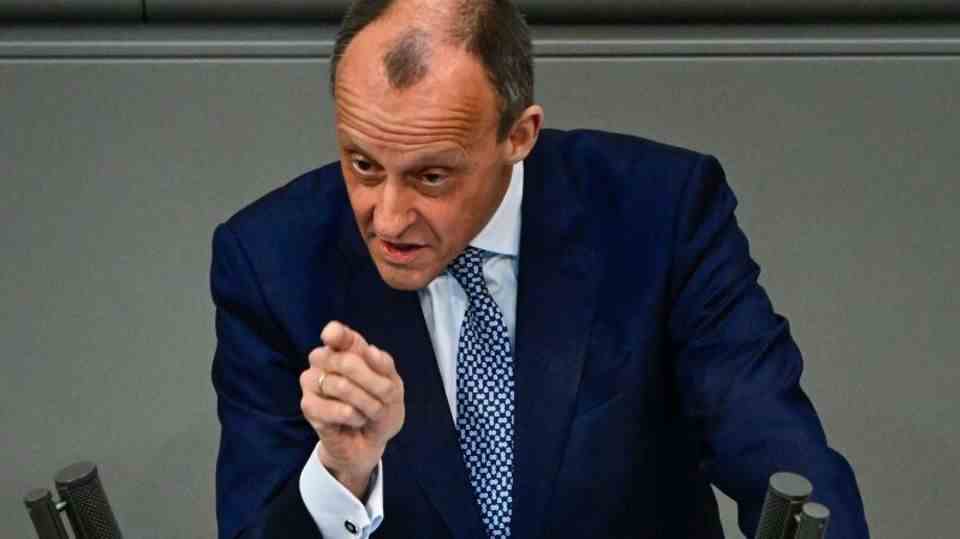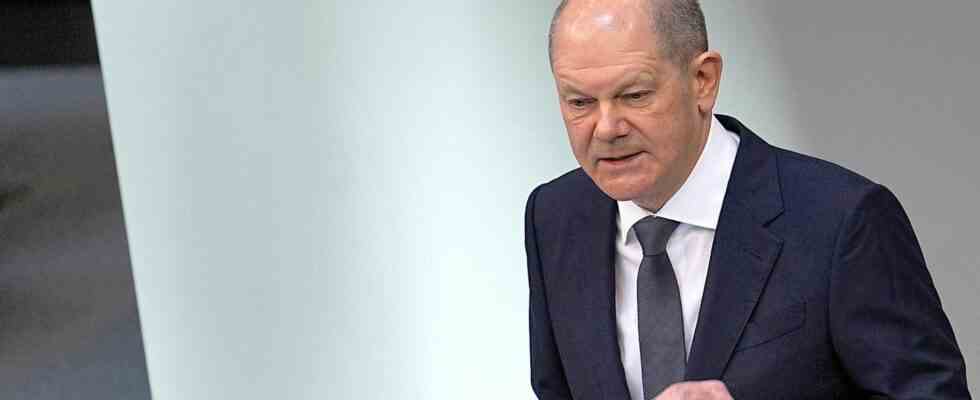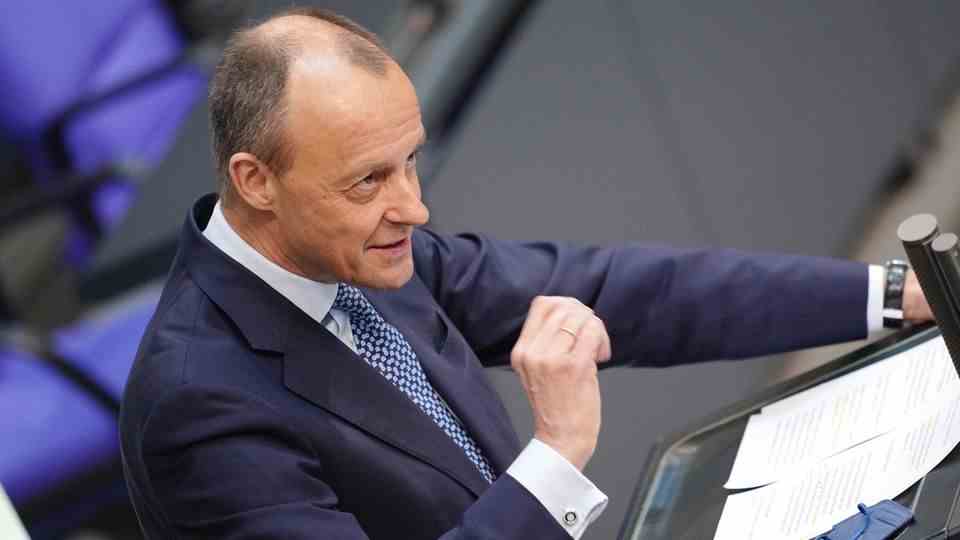press review
Verbal battle in the Bundestag
Scholz does it well, Merz does it better – this is how the media comment on the heated general debate
As usual, Chancellor Olaf Scholz (SPD) had to face a general debate in the budget debate on the budget of the Chancellery in the Bundestag
© Michael Kappeler / DPA
Most German media write that Chancellor Olaf Scholz did not cut a bad figure in the general debate in the Bundestag. But something is missing, which another speaker clearly shows.
Around a month after the start of the Russian war in Ukraine, Chancellor Olaf Scholz (SPD) defended his decision to rearm and set a new political course. In the general debate on the budget in the Bundestag on Wednesday, he promised Ukraine further aid, but at the same time drew a clear line for NATO involvement. The opposition made it clear that it wants to be more than just the majority procurer for the red-green-yellow government’s paradigm shift.
Most German media rate an appearance better than that of the Chancellor. The press review at a glance:
Frankfurter Rundschau
“The good thing about Scholz’s speech is that he stayed the course. He promises that despite everything about climate change, nothing will change and that this government stands by fairer wages and good health care. What is unusual is how he values solidarity of the people in Germany expresses with the Ukraine. “You’re doing well,” he says in a Hanseatic sober manner, but is probably overwhelmed. It shows how much good there is in Germany. That has huge potential for politics. If the citizens Citizens get involved. Even better, as in this case, go ahead. Get involved, help, donate, defend democracy and freedom. The government is lucky.”
Leipziger Volkszeitung
“It sounds arrogant when the Chancellor of the Union says that it’s ‘completely fine’ that you bring in your ideas for the implementation of the 100 billion euro special fund for the Bundeswehr. If you depend on their votes – and that is the traffic light for the necessary two-thirds majority for anchoring in the Basic Law – you have to bake smaller rolls.”
Pforzheim newspaper
“In his speech in the general debate, Olaf Scholz made it very clear that Germany’s willingness to help Ukraine has its limits. Scholz has good arguments – but as a speaker he seems strangely distant: Talking about war and peace could do with more rhetorical passion. Rhetorical scores against opposition leader Friedrich Merz. The CDU leader and Union faction leader is good for Parliament as a speaker. He strikes a sharp, yet factual tone. And he provokes counter-speech from the plenary, it’s turbulent in Parliament. That’s good! Stand by the Chancellor Domestically difficult weeks ahead. Scholz cannot stop at announcing historic projects. He will be measured by their implementation.”
Reutlingen General Gazette
“But is it concrete when Scholz promises that NATO will not become a party to the war? That can be Scholz’s wish. But it will be decided by others, especially in view of the latest developments. Kremlin spokesman Dmitri Peskov said that nuclear weapons only an existential threat to Russia. Putin confidant and former President Dmitry Medvedev soon hinted at what an ‘existential threat’ might mean Medvedev warned of a nuclear catastrophe unless the US stops its ‘primitive game’ – one alleged conspiracy to destroy Russia. Does that sound absurd? A lot of what is coming out of the Kremlin sounds absurd at the moment, and the world needs to realize that this Russian leadership is capable of anything.”

Rhein-Neckar-Zeitung (Heidelberg)
“It sounds reassuring when Olaf Scholz assures Ukraine of German solidarity, but at the same time makes it clear that neither the Federal Republic nor NATO will be a party to the war. A clear statement, Hanseatic cool – and that’s exactly why it sounds euphonious. There are enough warmongers these days. But is that also true, what Scholz assures? And is the authority to make the decision – whether to go to war or not – in his hands at all? There are considerable doubts about this. Should Putin escalate the conflict further, should he launch a (limited) nuclear strike, then it will formulated the answer in Washington. As of today, US President Joe Biden behaves like a (threatening) dove. How long will it stay that way?”
Swabian newspaper (Ravensburg)
“The Russian attack on Ukraine has turned the policy of the traffic light coalition upside down. The Green Economics Minister Robert Habeck is asking Qatar and the United Arab Emirates for gas supplies, the Bundeswehr is suddenly rediscovered as part of the country’s defense – and is to be upgraded with a lot of money This is due to the turning point that Chancellor Olaf Scholz is talking about. But his presence as Chancellor has not increased since then. Scholz could have used the general debate in Parliament to make it clear how difficult it is to bear, no longer for the people to be able to do in the Ukraine, because otherwise the peace in Germany would be endangered. Instead, he gave a brief account of what the Ukraine cannot expect from the West. This kind of objectivity comes across as ignorance.”
Southgerman newspaper
“In keeping with the general debate, the chancellor tried to calm things down in general. But he did not do justice to the debates in the country and the feelings of many Germans.”
Southwest Press (Ulm)
“Olaf Scholz gave a typical Olaf Scholz speech. It was obviously not his intention to sweep the hall away. If the chancellor had intended to fill the formula: “There is strength in peace”, then he is That failed. Olaf Scholz may be calm at the moment, but there was little sign of strength. The chancellor gives the impression that many things are going well: international cooperation, the effects of the sanctions, efforts to become independent of Russian oil and gas imports This old-fashioned calming tactic is inappropriate and, in view of the dangers, has a belittling effect. The war in Ukraine is raging with undiminished violence. It will not be ended with soporific speeches.”
The world
“It’s a blessing that Chancellor Olaf Scholz understands the political craft. But in times like these, that’s not enough. The businesslike manner with which he delivered his speech in the general debate in the Bundestag is reminiscent of the even more detailed speeches his predecessor gave on such occasions . But the political world situation has changed. Scholz has to find a way to convey this.”
Swell: DPA, “sueddeutsche.de”, “Welt.de”.


